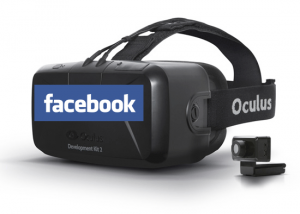 In what was some shocking tech news yesterday, , the company behind the best known VR headset for PCs. The deal valued at $2 billion is obviously a huge win for the founders of Oculus but why would a company based on social media want to buy a company that is producing virtual reality hardware? Facebook’s other purchases have mostly been of software companies that have distinct social media capabilities such as Instagram that specialized in sharing pictures. After all, Oculus has yet to actually release a product for consumers. Since its creation, it has only produced developer kits and the software support is still in its early stages. There are some big implications for both companies.
In what was some shocking tech news yesterday, , the company behind the best known VR headset for PCs. The deal valued at $2 billion is obviously a huge win for the founders of Oculus but why would a company based on social media want to buy a company that is producing virtual reality hardware? Facebook’s other purchases have mostly been of software companies that have distinct social media capabilities such as Instagram that specialized in sharing pictures. After all, Oculus has yet to actually release a product for consumers. Since its creation, it has only produced developer kits and the software support is still in its early stages. There are some big implications for both companies.
Oculus Expands its Audience
Much of the development of the Oculus has been specifically targeting its gaming potential. Sure, there are a number of artists and researchers that have put together some incredible demonstrations of how the technology can be used but the primary focus has always been on gaming. With the acquisition by Facebook, the company now has a greater amount of capital available to it for development of the platform to be used beyond just gaming. Now they have stated that they will continue to focus on gaming but Facebook in their press release specifically mentioned the potential for communications, media, entertainment and education.
With the increased reach of customers that Facebook can potentially bring to Oculus, the company can expand the number of people that may potentially purchase retail hardware or license its technology. Since Oculus is at its heart a hardware company, it needs to focus on developing a product that it will sell to consumers. At this point, that means supporting developers to build experiences that consumers will then want to buy the hardware for. Of course, it still has to get the product out of the door beyond just the now $350 developer kit.
Facebook Looking Beyond Social
Facebook is a very large corporation now with huge coffers. While they have focused heavily upon the social aspects of their network, the company has to look beyond the Facebook network. For one, many users and even companies have become fed up with Facebooks increasing focus on advertising and limiting the rate at which people see their messages. Companies in particular that were encouraged to use Facebook for their brand messages are now seeing that reach diminished unless they are willing to pay promotional costs to increase that viewership rate.
So, what does this have to do with Oculus? There are two major reasons Facebook would buy them. The first is to try and integrate the VR product into its social network. This would be similar to using Instagram to increase their reach of social network and sharing. Of course, that seems a bit hard to integrate into the Facebook network as what will people be sharing? Does another person have to use a 3D camera to record compatible 3D images or videos for others to view? Such technology has a huge cost to the users to experience not to mention the data costs to Facebook to carry such data.
The more likely reason is diversification of the Facebook portfolio. By getting into another business. Facebook hopes to avoid becoming another MySpace that sold for a huge amount then became irrelevant to the public and becoming a shell of what it once was. By getting into the virtual reality hardware business as it is developing, they have the potential to better shape how the hardware will be used and how the software will be supported. This gives it the potential to expand its revenue well beyond the advertising reliant model that Facebook currently exists on.
The Fallout
Since the announcement of the purchase, there has been some backlash against both Facebook and Oculus VR. Mojang founder and Minecraft creator Markus ‘Notch’ Persson announced that he was cancelling the from development. This is a fairly high profile game with wide exposure to those beyond PC gaming as Minecraft is now being used as an educational tool. Of course there are other more high profile projects that Oculus has showcased that are praising the deal so it is not all bad.
The most recent news though is that some of the people who participated in the that they helped to fund the development of the product only to see it sold off to a large corporation like Facebook. In essence, they provided the capital to found the company yet they have no equity in the company nor do they get a say in it. The problem with this is that Kickstarter is not a venture capital platform so they don’t have much recourse there. Still, this sentiment may end up hurting some of the company’s most potential loyal customers and proponents and could end up hurting some of their sales in the long run.
